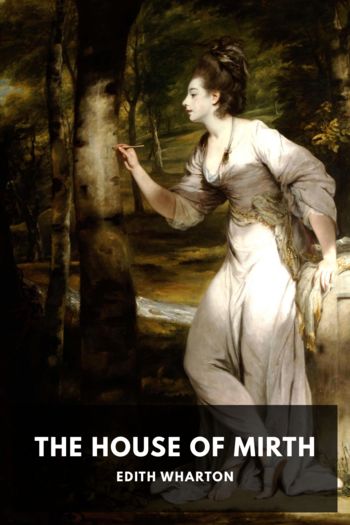The House of Mirth - Edith Wharton (phonics reader .txt) 📗

- Author: Edith Wharton
Book online «The House of Mirth - Edith Wharton (phonics reader .txt) 📗». Author Edith Wharton
Ruling the turbulent element called home was the vigorous and determined figure of a mother still young enough to dance her ball-dresses to rags, while the hazy outline of a neutral-tinted father filled an intermediate space between the butler and the man who came to wind the clocks. Even to the eyes of infancy, Mrs. Hudson Bart had appeared young; but Lily could not recall the time when her father had not been bald and slightly stooping, with streaks of grey in his hair, and a tired walk. It was a shock to her to learn afterward that he was but two years older than her mother.
Lily seldom saw her father by daylight. All day he was “down town”; and in winter it was long after nightfall when she heard his fagged step on the stairs and his hand on the schoolroom door. He would kiss her in silence, and ask one or two questions of the nurse or the governess; then Mrs. Bart’s maid would come to remind him that he was dining out, and he would hurry away with a nod to Lily. In summer, when he joined them for a Sunday at Newport or Southampton, he was even more effaced and silent than in winter. It seemed to tire him to rest, and he would sit for hours staring at the sea-line from a quiet corner of the verandah, while the clatter of his wife’s existence went on unheeded a few feet off. Generally, however, Mrs. Bart and Lily went to Europe for the summer, and before the steamer was half way over Mr. Bart had dipped below the horizon. Sometimes his daughter heard him denounced for having neglected to forward Mrs. Bart’s remittances; but for the most part he was never mentioned or thought of till his patient stooping figure presented itself on the New York dock as a buffer between the magnitude of his wife’s luggage and the restrictions of the American customhouse.
In this desultory yet agitated fashion life went on through Lily’s teens: a zigzag broken course down which the family craft glided on a rapid current of amusement, tugged at by the underflow of a perpetual need—the need of more money. Lily could not recall the time when there had been money enough, and in some vague way her father seemed always to blame for the deficiency. It could certainly not be the fault of Mrs. Bart, who was spoken of by her friends as a “wonderful manager.” Mrs. Bart was famous for the unlimited effect she produced on limited means; and to the lady and her acquaintances there was something heroic in living as though one were much richer than one’s bankbook denoted.
Lily was naturally proud of her mother’s aptitude in this line: she had been brought up in the faith that, whatever it cost, one must have a good cook, and be what Mrs. Bart called “decently dressed.” Mrs. Bart’s worst reproach to her husband was to ask him if he expected her to “live like a pig”; and his replying in the negative was always regarded as a justification for cabling to Paris for an extra dress or two, and telephoning to the jeweller that he might, after all, send home the turquoise bracelet which Mrs. Bart had looked at that morning.
Lily knew people who “lived like pigs,” and their appearance and surroundings justified her mother’s repugnance to that form of existence. They were mostly cousins, who inhabited dingy houses with engravings from Cole’s Voyage of Life on the drawing-room walls, and slatternly parlour-maids who said “I’ll go and see” to visitors calling at an hour when all right-minded persons are conventionally if not actually out. The disgusting part of it was that many of these cousins were rich, so that Lily imbibed the idea that if people lived like pigs it was from choice, and through the lack of any proper standard of conduct. This gave her a sense of reflected superiority, and she did not need Mrs. Bart’s comments on the family frumps and misers to foster her naturally lively taste for splendour.
Lily was nineteen when circumstances caused her to revise her view of the universe.
The previous year she had made a dazzling debut fringed by a heavy thundercloud of bills. The light of the debut still lingered on the horizon, but the cloud had thickened; and suddenly it broke. The suddenness added to the horror; and there were still times when Lily relived with painful vividness every detail of the day on which the blow fell. She and her mother had been seated at the luncheon-table, over the chaufroix and cold salmon of the previous night’s dinner: it was one of Mrs. Bart’s few economies to consume in private the expensive remnants of her hospitality. Lily was feeling the pleasant languor which is youth’s penalty for dancing till dawn; but her mother, in spite of a few lines about the mouth, and under the yellow waves on her temples, was as alert, determined and high in colour as if she had risen from an untroubled sleep.
In the centre of the table, between the melting marrons glacés and candied cherries, a pyramid of American Beauties lifted their vigorous stems; they held their heads as high as Mrs. Bart, but their rose-colour had turned to a dissipated purple, and Lily’s sense of fitness was disturbed by their reappearance on the luncheon-table.
“I really think, mother,” she said reproachfully, “we might afford a few fresh flowers for luncheon. Just some jonquils or lilies-of-the-valley—”
Mrs. Bart stared. Her own fastidiousness had its eye fixed on the world,





Comments (0)